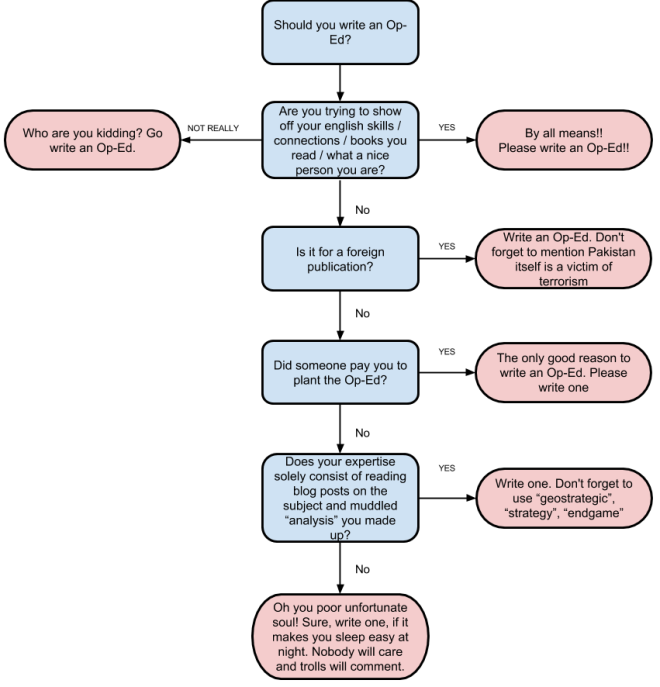Because the jewish people always hated Pakistan and want to side with the Hindus against Pakistan.
Kidding Kidding. There is another reason. First I digress:
Pakistan has written to the Permanent Five complaining about the latest fracas on the border:
“He (Sartaj Aziz) expressed his concern that the ceasefire violations by India and the provocative statements by Indian leadership were not only a setback to peace efforts but also a distraction from Pakistan’s counter-terrorism commitments in the ongoing Operation Zarb-e-Azb (operation in North Waziristan)”
Pakistan probably has to be satisfied with a tepid platitude from the P5, leading to yet another round of soul searching “But why do they hate Pakistan. India has better PR. Pakistan has a trust deficit. Because Jews”. I wanted to get ahead of the curve and give you an answer. You are welcome.
On many issues Pakistan and India have been treated on an equal basis: For example, nuclear sanctions were lifted on both Pakistan and India, the world stepped in restrain India after the attack on India’s parliament, and after attacks in Mumbai and so on. These have given an impression that Pakistan has won an equal treatment based on its moral and righteous position on these issues, and India was chastised for being wrong.
On other occasions, for example during the Kargil crisis or the civil nuclear deal, Pakistan has simply been ignored and has received ignominious treatment vis-a-vis India, confusing Pakistanis on why the international community is so fickle, causing people to soul search “Why Does the World Hate Pakistan?”.
The point is simple. On occasions in which the world has sided with Pakistan, they did so not due to the strength of Pakistan’s moral position, but merely due to the fear of Pakistan’s mischief making potential. Nuclear sanctions were lifted, India was restrained after Parliament and Mumbai attacks because the west needed Pakistan’s cooperation on dealing with the taliban. It was merely an acknowledgement of the magnitude of nuisance Pakistan can create rather than a recognition that Pakistan was in the right and India was in the wrong. Pakistanis (with ample help from the media and analysts) take these affirmations of support as a reaffirmation of Pakistan’s “principled stand” and add one more “diplomatic victory” to the kitty. The reality is that nobody really believes Pakistan had nothing to do with Mumbai attacks, or that AQ Khan exported nukes without Pakistan Army’s help (while Pakistan was ruled by a military dictatorship) or that Osama Bin Laden was chilling in Abbottabad without Pakistan’s knowledge. They just choose to ignore it (for now) as they secure Pakistan’s cooperation in not indulging in mischief, like bombing too many election candidates in Afghanistan.
What fascinates me though is that every one of such “diplomatic victories” secured with the threat of mischief making is passed off by Pakistani intelligentsia, media and leaders as a great victory of Pakistan’s resolute position, moral arguments or principled stand. This sets up for eventual disappointment like when neither China nor US supported Pakistan’s case in Kargil. Or when “Nuclear” is used in the context of “annihilation” and not “Power plants” when Pakistan is present in the same sentence. Relying on one’s ability to spoil the party does not engender goodwill, it buys resentful tolerance at best.
Coming back to the P5: India-China trade volume is $80 billion, India is negotiating a multi-billion dollar fighter aircraft purchase from France, and multi billion dollar trade pacts with the US. Even China, Pakistan’s taller than mountain, deeper than ocean friend, has a 30% approval rating for Pakistan based on some random Pew study I saw. Think about it from the perspective of the Chinese: Pakistan is a place where Osama was hiding, Xinxiang terrorists get trained, Taliban cool their heels and their hard earned money goes into a bottomless pit. India is a place where they do $80 billion of their trade.
Why does Pakistan think the P5 will support them? The clue lies in:
“Distraction from Pakistan’s counter-terrorism commitments in the ongoing Operation Zarb-e-Azb”
which any diplomat will read as “Support Pakistan else the operation against Taliban will stop and they get a free hand in Afghanistan”.
Pakistan might secure a “diplomatic victory” based on its “principled stand” depending on how credible the world thinks this latest Taliban threat is. But is it any surprise that Jewish people and their nefarious conspiracies are not needed at all for the international community and the P5 to continue hating Pakistan?
 Educationalist and model Fatima: “…and that is why I never fail to tell my filipno maid that she should have paid more attention in class. That is why I work for universal access to education so everyone can afford Filipino maids.”
Educationalist and model Fatima: “…and that is why I never fail to tell my filipno maid that she should have paid more attention in class. That is why I work for universal access to education so everyone can afford Filipino maids.”







